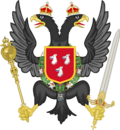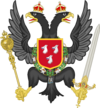Chancellor of Atmora: Difference between revisions
No edit summary |
|||
| Line 50: | Line 50: | ||
==Activities post-commission== | ==Activities post-commission== | ||
{{Template:Atmora topics}} | |||
Revision as of 06:26, 14 June 2020
| Prime Minister of Atmora Rijksminister-president van Atmora | |
|---|---|
 State Coat of Arms used by HM's Government | |
 Standard of the Prime Minister | |
| Government of Atmora Office of the Prime Minister | |
| Style | Prime Minister (informal) The Right Honourable (formal; within Atmora and the Empire) Mister Prime Minister (informal) His Excellency (in international correspondence) |
| Member of | Privy Council • Cabinet • Parliament • National Security Council |
| Reports to | |
| Residence | Cadworth Manor • Harrington Lake |
| Appointer | Monarch of Atmora |
| Term length | At Her Imperial Majesty's pleasure |
| Inaugural holder | 3rd Count of Moltke |
| Formation | 1812 |
| Deputy | Deputy Prime Minister |
| Salary | ƒ450,000 ($801,000) |
| Website | www |
The Prime Minister of Atmora (Iravian: Rijksminister-president van Atmora) is the primary minister of the Crown, chairman of the Cabinet, and thus head of government for Atmora, charged with advising the Atmoran monarch on the exercise of the executive powers vested in them by the constitution. Not outlined in any constitutional document, the office exists only as per long-established convention that stipulates the monarch, must select as prime minister the person most likely to command the confidence of the elected House of Commons; this individual is typically the leader of the political party that holds the largest number of seats in that chamber. Atmoran prime ministers are styled as The Right Honourable (Iravian: Het Recht Eervol), a privilege maintained for life.
The current, and 31st, Prime Minister of Atmora is the Conservative Party's Christopher A. Testarossa, who was appointed on 17 March 2091, by Henrietta II, following the 2091 federal elections.

